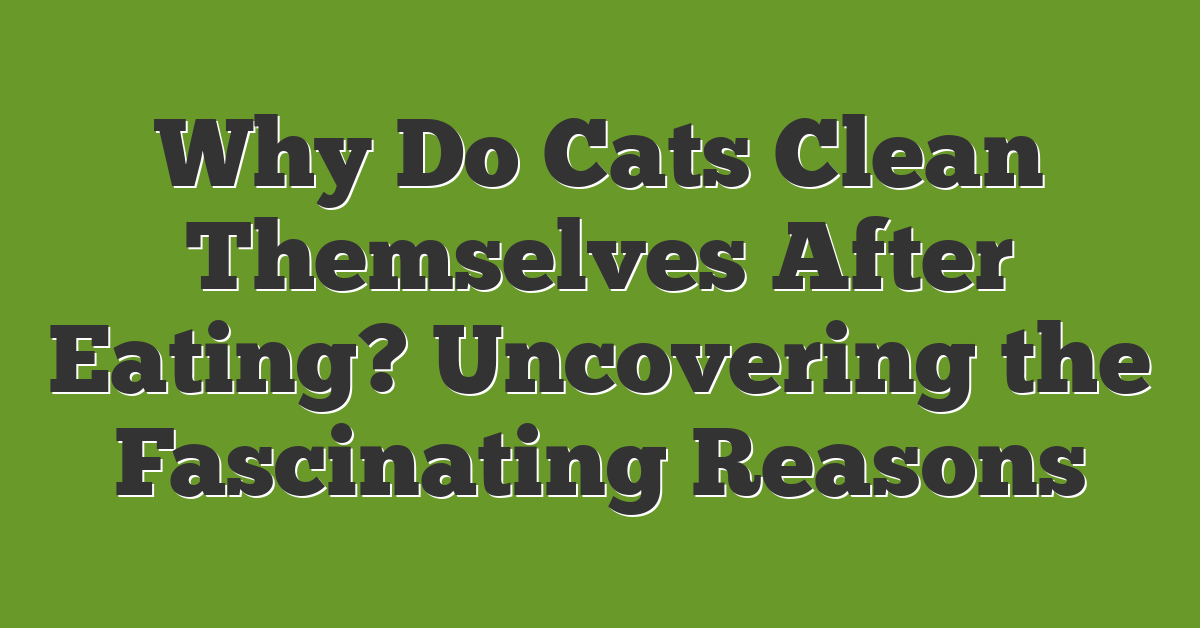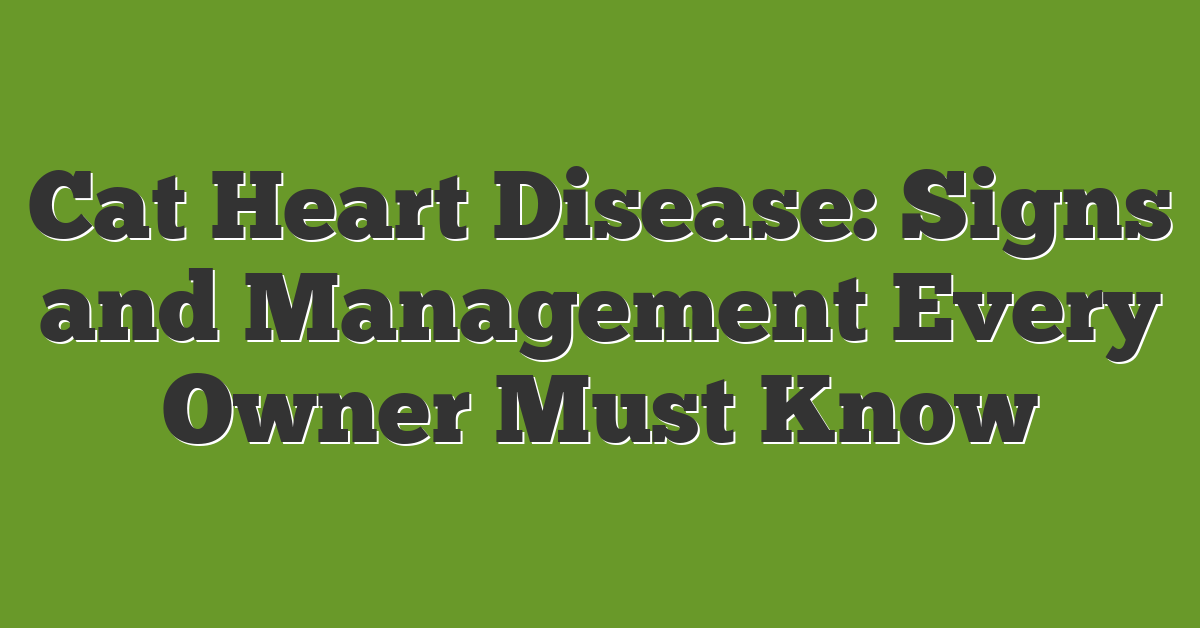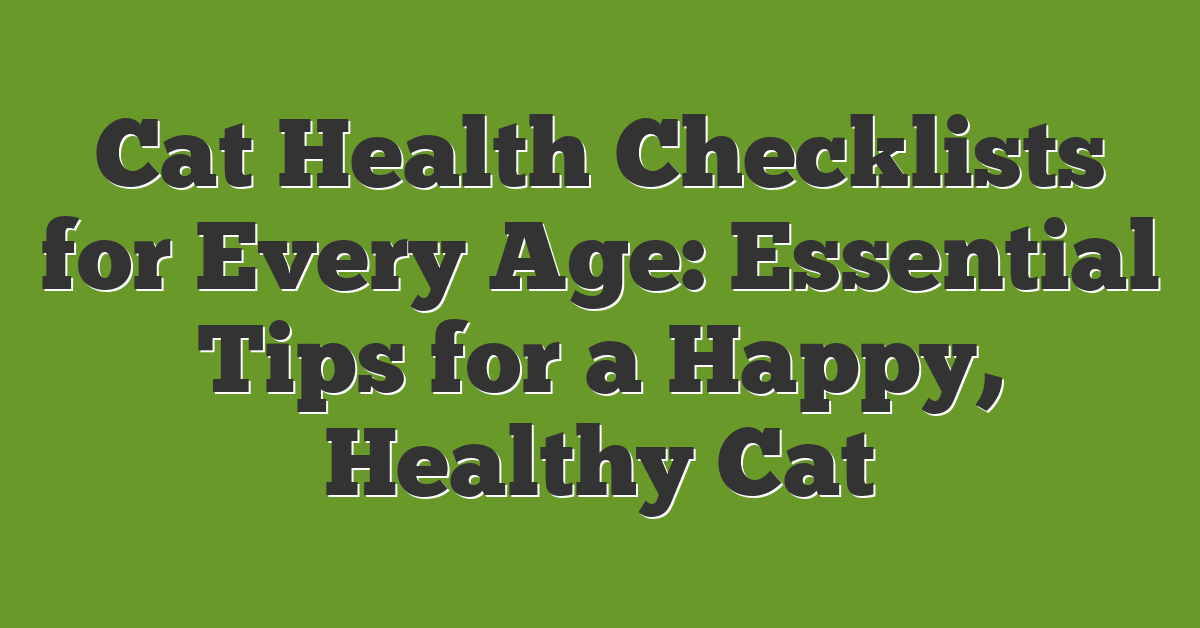Why Do Cats Clean Themselves After Eating?
As a cat lover and enthusiast, you may have noticed that your feline friend always cleans themselves meticulously after they finish their meal. But have you ever wondered why cats engage in this post-meal grooming behavior? Let’s take a closer look at a few reasons behind this fascinating cat ritual.
Maintaining Cleanliness: Cats are known for their cleanliness, and grooming plays a vital role in their daily routine. After eating, cats may have food particles or residue on their fur, especially around their mouth and paws. They use their rough tongues, which are covered in tiny backwards-facing barbs called papillae, to clean themselves thoroughly. By removing any leftover food or debris, your cat is keeping their coat clean and preventing potential skin irritations or infections.
Stimulating Blood Circulation: Have you noticed how cats vigorously lick their fur after eating? This grooming behavior not only cleans their coat but also stimulates blood circulation. The abrasive action of their tongues against their fur helps to increase blood flow to their skin. This improved circulation helps maintain the health of their skin and promotes hair growth.
Bonding and Marking Territory: Grooming after a meal is also a way for cats to bond with each other, especially in multi-cat households. Mutual grooming, also known as allogrooming, helps strengthen social bonds and maintain a harmonious group dynamic. Additionally, cats have scent glands located on various parts of their body, and when they groom, they spread their unique scent onto their fur. This scent marking serves as a way for cats to claim their territory and communicate their presence to other felines.
Reducing Stress and Anxiety: Cats are creatures of routine and habit. After a meal, grooming provides them with a sense of comfort and relaxation. It helps them unwind, destress, and create a calming environment. By indulging in this post-meal grooming routine, your cat is finding solace and reassurance in familiar activities.
The Fascinating Reasons Behind Cats’ Post-Meal Grooming
You may have noticed that your feline friend has a unique habit of grooming themselves after a meal. It’s a behavior that has fascinated cat lovers, enthusiasts, and experts alike. But why do cats clean themselves after eating? Let’s explore the fascinating reasons behind this grooming ritual.
1. Maintaining Cleanliness: Cats are known for their impeccable cleanliness. Grooming after a meal allows them to remove any food particles that may have stuck to their fur. By licking and meticulously cleaning themselves, they ensure that they stay fresh and hygienic.
2. Stimulating Blood Circulation: The act of grooming stimulates blood circulation throughout a cat’s body. When they lick their fur, their tongues act like natural brushes, massaging their skin and promoting better blood flow. This helps to keep their skin healthy and their coat lustrous.
3. Strengthening Social Bonds: Grooming is not just a solo activity for cats. It’s also a way for them to bond with their fellow felines. When cats groom each other, it strengthens their social connections and demonstrates trust and affection. So, after a meal, your cat may engage in self-grooming to maintain their personal hygiene as well as communicate their presence and intentions to other cats.
4. Marking Territory: Cats have scent glands on their faces and bodies, and by licking themselves, they distribute their unique scent. This serves as a way for cats to mark their territory and communicate with other cats. So, after a satisfying meal, your cat may engage in grooming to leave their personal mark.
5. Reducing Stress and Anxiety: Grooming also serves as a form of self-soothing for cats. It helps them relax and alleviate stress and anxiety. After a meal, your cat may groom themselves as a way to find comfort and unwind. It provides them with a sense of security and allows them to create a peaceful environment.
As you can see, there are multifaceted reasons why cats clean themselves after eating. This post-meal grooming ritual not only maintains their cleanliness and promotes good circulation but also strengthens their social bonds, marks their territory, and helps them relax. So, the next time you see your cat indulging in post-meal grooming, remember the fascinating reasons behind this interesting behavior.
Maintaining Cleanliness: The Importance of Hygiene
You know how important it is to keep yourself clean and fresh. Well, the same goes for our feline friends! Cats are known for their impeccable grooming habits, and one of the times you might notice them cleaning themselves is right after a meal. But have you ever wondered why?
Maintaining cleanliness is a vital part of a cat’s routine. After they finish eating, cats instinctively start grooming themselves. This post-meal grooming serves multiple purposes, including keeping their bodies clean and free of any food particles or debris.
By licking their fur, cats remove any remaining food or residue that might have stuck to their paws or face during their meal. This helps prevent skin irritations or infections that could arise from the presence of leftover food. In addition, grooming helps promote hair growth, giving their coat a healthy and shiny appearance.
Not only does post-meal grooming help cats look their best, but it also plays a role in stimulating blood circulation. When cats lick their fur, it stimulates the blood vessels in their skin, improving circulation and keeping them feeling energized.
But it’s not just about hygiene and circulation. Post-meal grooming also helps cats strengthen social bonds with other cats. You might have noticed that cats groom each other as a way of bonding and showing affection. By grooming themselves after a meal, cats mimic this behavior, reinforcing social connections and maintaining a sense of belonging within their feline community.
As an expert in all things cat-related, I can also tell you that post-meal grooming is a cat’s way of communicating their presence to other cats. By grooming themselves, cats leave their scent on their fur, which acts as a form of territorial marking. This lets other cats know that they’ve been there and leaves a subtle message that this is their territory.
Furthermore, after a satisfying meal, cats often feel a sense of comfort and relaxation. Engaging in grooming activities helps them reduce stress and anxiety. It’s their own version of a spa day, allowing them to unwind and find a peaceful state of mind.
Marking Territory: The Scent of Success
You may have noticed that after your cat finishes a meal, they start grooming themselves. But did you know that this grooming behavior serves another purpose? It’s all about marking their territory! Here’s what you need to know about your feline friend’s unique scent-marking habit.
1. Leaving Their Scent Behind
Cats have scent glands located on various parts of their body, including their face, paws, and tail. When they groom themselves, they are spreading their unique scent onto their fur. This scent acts like a calling card, letting other cats know that they have been there. By marking their territory, cats are communicating their presence to other feline neighbors.
2. Maintaining Social Bonds
Grooming after a meal also helps cats strengthen their social bonds with other cats. Social grooming is a common behavior among cats that live together. By grooming themselves, they are simulating the grooming behavior that cats use to bond with each other. So even if your cat is an only pet, they still have that instinct to maintain social connections through self-grooming.
3. Reducing Stress and Anxiety
In addition to marking territory and strengthening social bonds, post-meal grooming also helps to reduce stress and anxiety in cats. Grooming provides them with a sense of comfort and relaxation. It allows cats to engage in a self-soothing behavior, which can be especially helpful after a meal when their bodies are in a more relaxed state.
4. Promoting Good Health
Not only does grooming help cats mark their territory and reduce stress, but it also promotes good health. By licking their fur, cats remove any leftover food particles that may be stuck in their fur after eating. This helps to keep their coat clean and prevents skin irritations or infections. Additionally, grooming stimulates blood circulation and promotes healthy hair growth.
Cats are fascinating creatures with unique behaviors, and self-grooming after a meal is one of them. It’s a multi-purpose behavior that allows cats to mark their territory, maintain social bonds, reduce stress, and promote good health. So the next time you see your feline friend indulging in a grooming session after a meal, remember that they are doing much more than just staying clean – they are communicating, bonding, and taking care of themselves.
Uncovering the Motivations: Exploring Feline Behavior
As a cat lover, you may often wonder why cats engage in such meticulous grooming rituals, especially after a satisfying meal. To understand why cats clean themselves after eating, let’s delve into the fascinating world of feline behavior.
Maintaining Cleanliness and Removing Food Particles
Cats are notorious for their cleanliness, and after a meal, they instinctively groom themselves to maintain impeccable hygiene. By licking their fur, they remove any food particles that may have gotten stuck during feeding. This grooming behavior not only keeps their coat clean but also helps prevent skin irritations or infections.
Promoting Hair Growth and Stimulating Blood Circulation
Grooming after a meal serves another vital purpose for felines: promoting hair growth and stimulating blood circulation. When cats lick their fur, their rough tongues act like natural brushes, removing loose hairs and distributing natural oils. This not only keeps their coat in pristine condition but also improves blood flow to the skin, promoting overall health.
Strengthening Social Bonds with Other Cats
You may have noticed that cats often groom each other after a meal. This seemingly affectionate behavior serves as a way for cats to strengthen their social bonds. Through grooming, cats engage in mutual grooming sessions known as allogrooming, which establishes trust and nurtures their sense of community.
Scent Marking and Communication
Grooming after a meal also enables cats to leave their unique scent on their fur, known as scent marking. By spreading their scent onto their fur, cats not only mark their territory but also communicate their presence to other felines. This helps maintain a harmonious social hierarchy and prevents unnecessary conflicts.
Reducing Stress and Promoting Relaxation
After a satisfying meal, cats often feel relaxed and content. Engaging in post-meal grooming not only serves as a means to maintain cleanliness but also provides them with a sense of comfort and relaxation. The rhythmic act of grooming helps cats unwind and alleviate any stress or anxiety they may be feeling.
Understanding why cats clean themselves after eating sheds light on their innate behaviors and instincts. From ensuring cleanliness and promoting hair growth to strengthening social bonds and reducing stress, post-meal grooming serves multiple purposes for our feline friends.
Next, let’s dive deeper into the intriguing world of scent marking and its role in feline communication.
Conclusion
Now you know why cats clean themselves after eating! It’s not just a random behavior; there are actually several reasons behind it. Cats are naturally clean animals, and grooming after a meal helps them maintain their hygiene by removing any food particles that may be stuck in their fur. This grooming also helps prevent skin irritations or infections.
But it’s not just about cleanliness. Grooming after eating also has other benefits for cats. It promotes hair growth and stimulates blood circulation, keeping their coat healthy and shiny. It also helps cats strengthen their social bonds with other cats, as they use scent marking to communicate their presence.
Furthermore, post-meal grooming is a way for cats to reduce stress and anxiety. It provides them with a sense of comfort and relaxation, allowing them to unwind after a meal.
So, the next time you see your cat grooming itself after eating, you’ll know that it’s not just a random habit. It’s a natural behavior that serves multiple purposes and contributes to their overall well-being.
Frequently Asked Questions
Q: Why do cats clean themselves after eating?
Cats clean themselves after eating to maintain cleanliness, remove food particles, prevent skin irritations or infections, promote hair growth, and stimulate blood circulation.
Q: What are the social benefits of post-meal grooming for cats?
Post-meal grooming helps cats strengthen social bonds with other cats, communicate their presence through scent marking, and reduce stress and anxiety.
Q: Does post-meal grooming provide comfort for cats?
Yes, post-meal grooming provides cats with a sense of comfort and relaxation.














